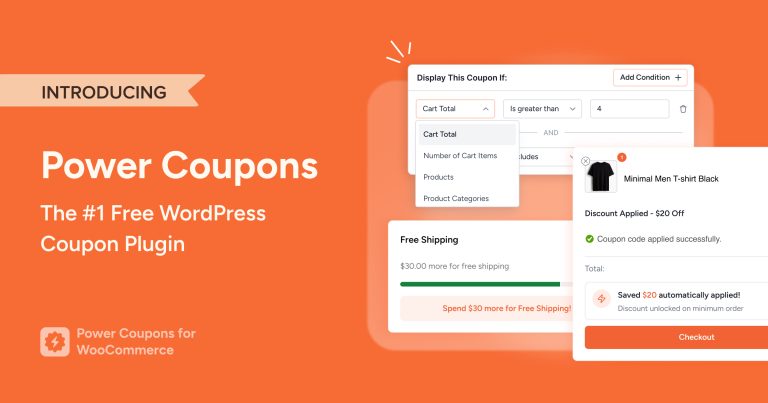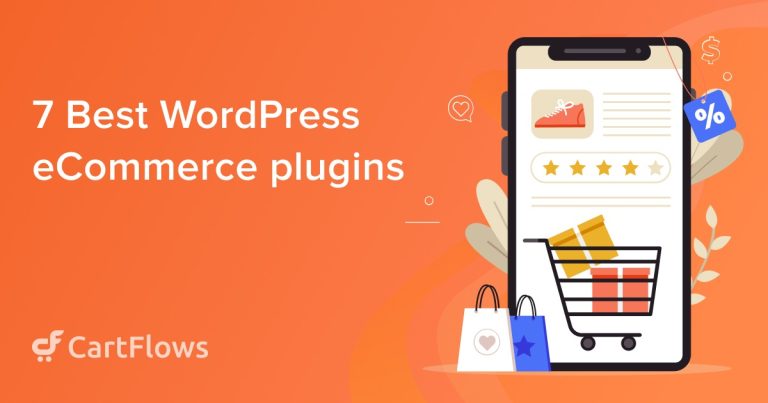Default WooCommerce comes with the basics. You can sell products, accept payments, and manage orders.
But customers need faster checkout. They abandon carts. Search engines don’t list your products. And competitors can pull ahead with new features you don’t have.
WooCommerce extensions can help you give your customers all these features.
We have built hundreds of online stores in our time, and we’ve tested hundreds of plugins. Here are the 17 we would (and do) use ourselves.
These extensions consistently deliver results and turn basic WooCommerce stores into revenue machines!
What Are WooCommerce Extensions?
WooCommerce extensions are plugins made for e-commerce stores and extend what they can do.
Some add new payment options. Some improve checkout. Some automate emails or boost SEO. Others help with analytics.
They use the same principle as WordPress plugins:
- WordPress plugins can be general-purpose. They might add a form, a gallery, or a page builder to any WordPress site.
- WooCommerce extensions are built for stores. They work with products, carts, orders, taxes, customer data, and checkout flows.
How To Choose the Right WooCommerce Extensions
Instead of starting with “what extensions”, start with what you want to improve for your store this quarter.
Faster checkout? More repeat sales? Less manual work? The right extensions will help you achieve these goals.
We like to map each extension to a specific outcome with these two questions:
- Will it replace manual tasks or unlock revenue?
- Will it work well with our current setup?
If the answer is yes to both, it’s worth checking out.
When testing store extensions, we look for:
- Compatibility: Make sure the extension supports your version of WordPress, WooCommerce, and PHP. Check that it plays well with your theme and other key plugins.
- Support: Pick plugins with active developers and clear documentation. Look for recent updates and quick responses. Good support saves hours when something breaks!
- Security: Choose trusted developers and use extensions that have regular security updates and transparent changelogs. That’s especially important for e-commerce stores since we handle sensitive customer payment and identity data.
- Business goals: Tie each extension to a clear outcome. For example, you can add CartFlows to raise the average order value, MailPoet to grow repeat purchases, and Smush to improve load speed. If a plugin does not deliver a tangible result, skip it.
Extension Categories
To keep things manageable, we grouped extensions into seven categories:
- Payments and checkout
- Marketing conversion
- SEO
- Product management
- Fulfillment
- Customer experience
- Analytics and reporting
Each has an important part to play in a store, and each is an area where WooCommerce falls a little short.
Payments and Checkout
A smooth payment and checkout experience is the lifeblood of any store.
1. CartFlows
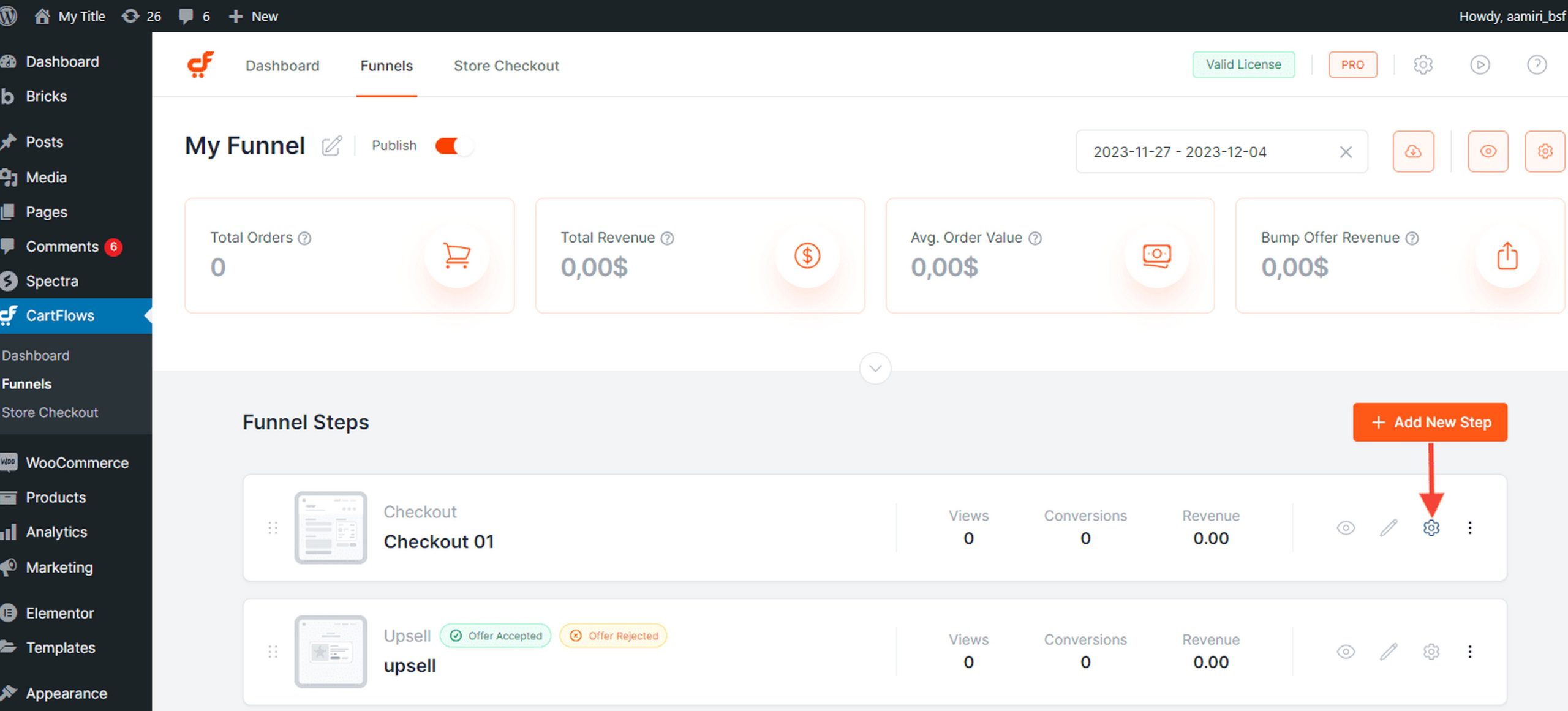
CartFlows is designed to upgrade your standard WooCommerce checkout experience into an optimized sales funnel.
You can design multi-step checkout pages where you can customize each step, add order bumps, offer one‑click upsells, recommend products and give customers a great experience.
All those things should result in increased average order value and happier customers.
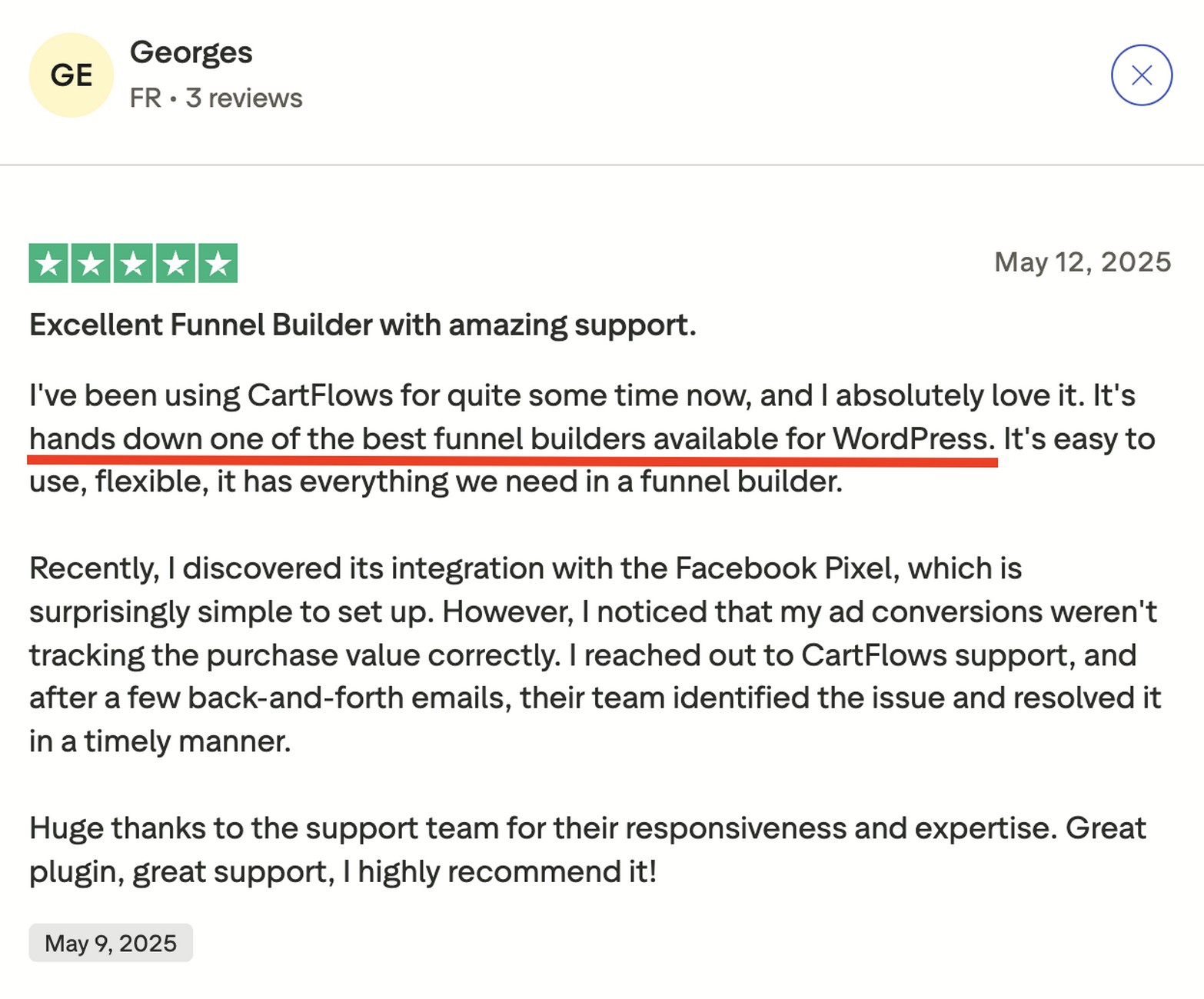
Why we like it:
- Templates for high‑converting checkout pages
- Order bumps on the checkout screen to lift average order value
- One‑click upsells and downsells after checkout
- Modern Cart adds a slide‑out cart, delivery estimates, and free shipping bars
When to choose it:
- You want more revenue from the same traffic
- You want to remove clutter from checkout pages
- You need flexible funnels for launches, bundles, or seasonal sales
2. Stripe Payment Gateway
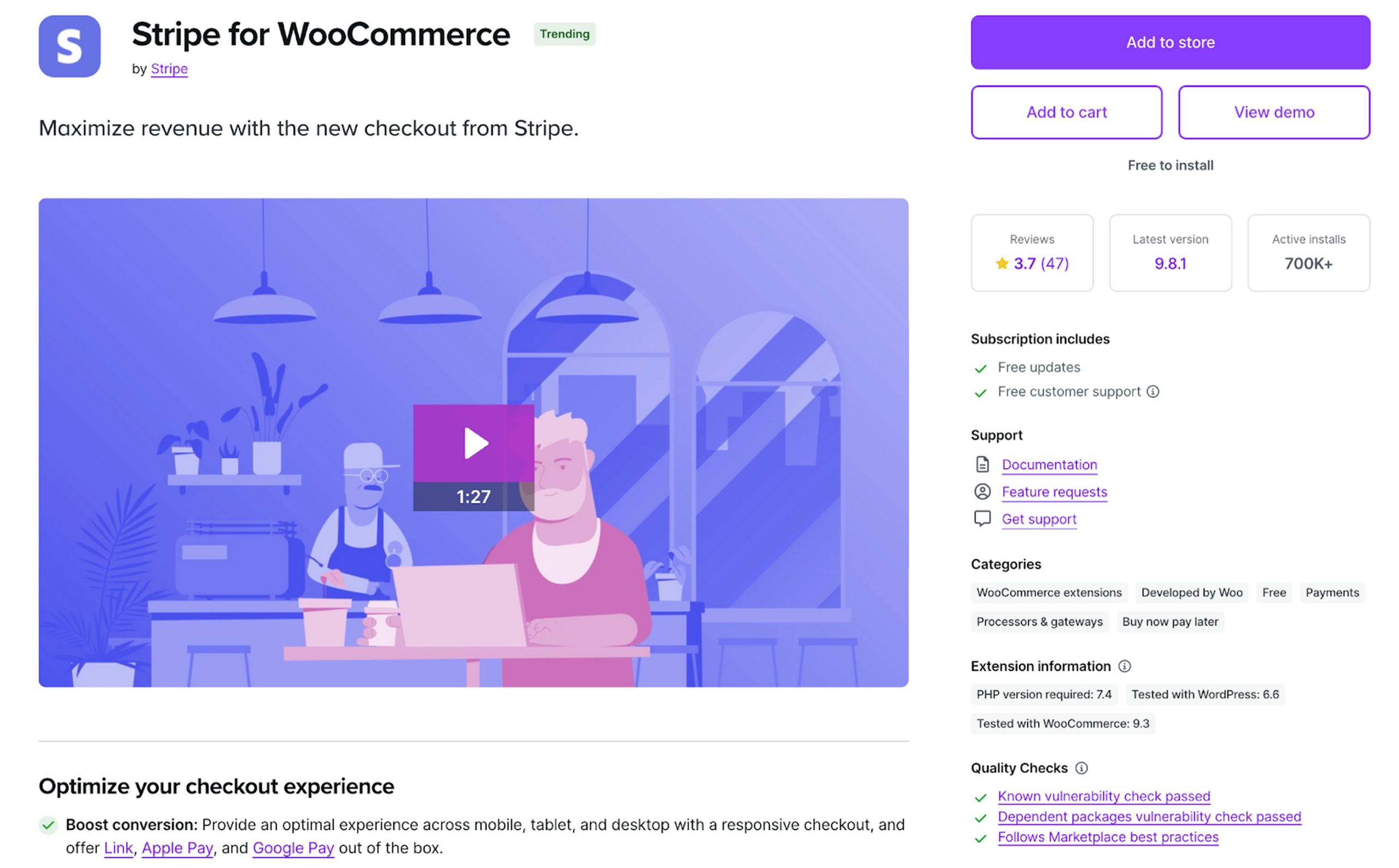
Stripe is one of the largest payment gateways in the world. It supports many currencies and payment methods by default and has strong fraud extensions and great reliability.
If you sell internationally, Stripe is definitely one of the payment gateways we would recommend!
Why we like it:
- Broad country and currency coverage
- Support for digital wallets and local methods
- Subscriptions, recurring billing, and saved cards are well supported
- Developer‑friendly for advanced needs
When to choose it:
- You sell across borders or plan to expand
- You offer subscriptions or memberships
- You want maximum flexibility now and later
Limitations:
- Some advanced features may need technical setup
- You may manage some details inside the Stripe dashboard, rather than only in WooCommerce
3. Woo Payments
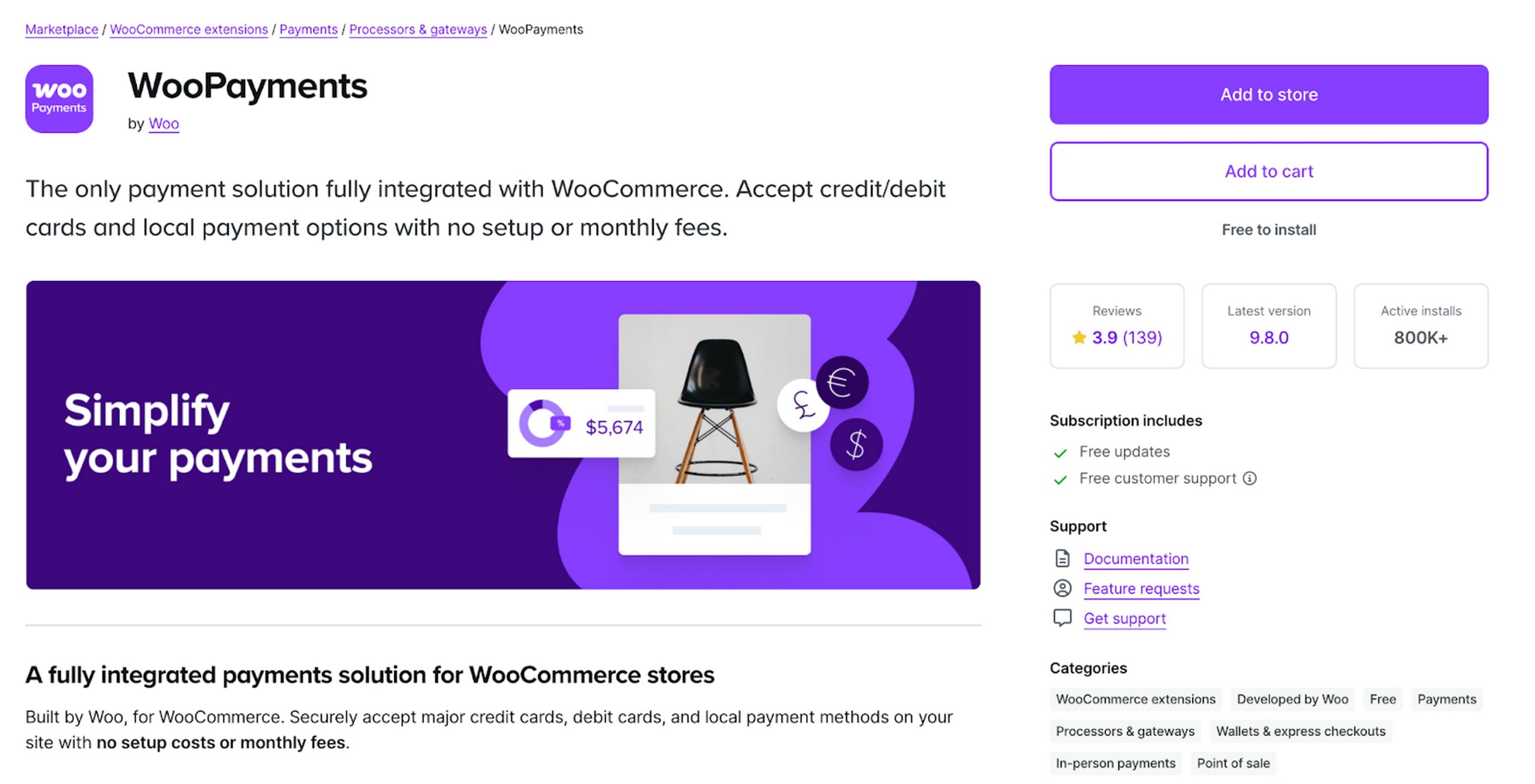
Woo Payments is designed by the company behind WooCommerce, so it’s compatible and as close to the native experience as possible.
With Woo Payments, you can manage payments and disputes without leaving your WordPress dashboard. And the tight integration keeps things simple for day-to-day operations.
Why we like it:
- Easy setup and native admin flow
- Works with popular wallets like Apple Pay and Google Pay
- Solid for stores focused on the U.S., Canada, and other supported regions
- Clean reporting inside WooCommerce
When to choose it:
- You want a “works out of the box” option that feels native
- Your market is mostly in the list of supported countries
- You prefer to manage payouts and disputes inside the same dashboard
Limitations:
- Country availability is narrower than some global gateways
- If you sell across many regions, you may want a gateway with a broader reach
Marketing
Marketing is where your store begins to feel like a system, where you’ll capture attention, follow up with visitors and bring customers back time and again.
4. Facebook for WooCommerce

Considering so many social media channels are owned by Meta, the parent company of Facebook, Instagram, and WhatsApp, integrating your store with the Facebook Business Manager account is essential.
This WooCommerce extension helps you do that, syncs your product catalog and automatically adds a pixel for tracking.
Why we like it:
- Your product catalog stays in sync with the Shop and ads
- You can retarget visitors with the exact items they viewed
- You can build your audience from purchase data
- Automatic pixel installation and configuration
When to choose it:
- You run, or plan to run, Facebook or Instagram ads
- You want to use Facebook Shop features
- You need retargeting capabilities for social commerce
- You want to track conversions from social media traffic
Limitations:
- Dependent on Facebook’s policies and platform changes
- Privacy regulations may limit tracking effectiveness
- Requires an active Facebook Business Manager account for management
5. MailPoet
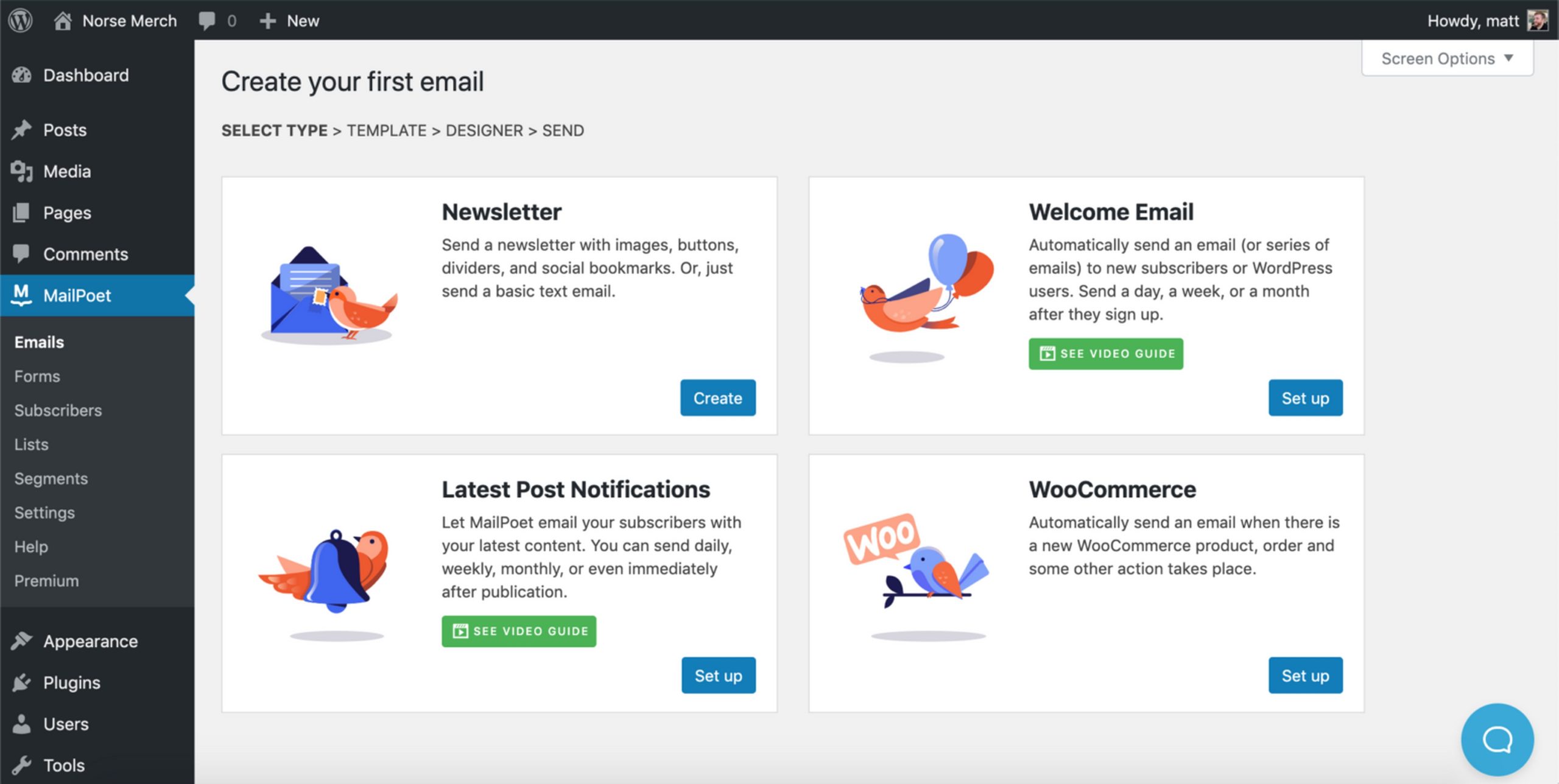
MailPoet is built into WordPress and has an intuitive editor and seamless WooCommerce integration.
It creates prebuilt segments based on purchase history and makes it easy to set up email sequences for welcome mails, post-purchase follow-ups and win-back campaigns.
Adding engaging and localize audio through AI dubbing can further personalize these campaigns and reach customers who prefer listening over reading.
Why we like it:
- Native WordPress integration with a familiar interface
- Prebuilt WooCommerce segments and triggers
- Simple abandoned cart reminders
- Automated welcome and post-purchase sequences
When to choose it:
- You want email marketing that feels native to WordPress
- You prefer simplicity over advanced features
- You’re starting with email marketing and need basic flows
- You want to manage everything from your WordPress dashboard
Limitations:
- Less advanced than dedicated email platforms
- Limited A/B testing capabilities
- Fewer third-party integrations than standalone email services
6. OttoKit
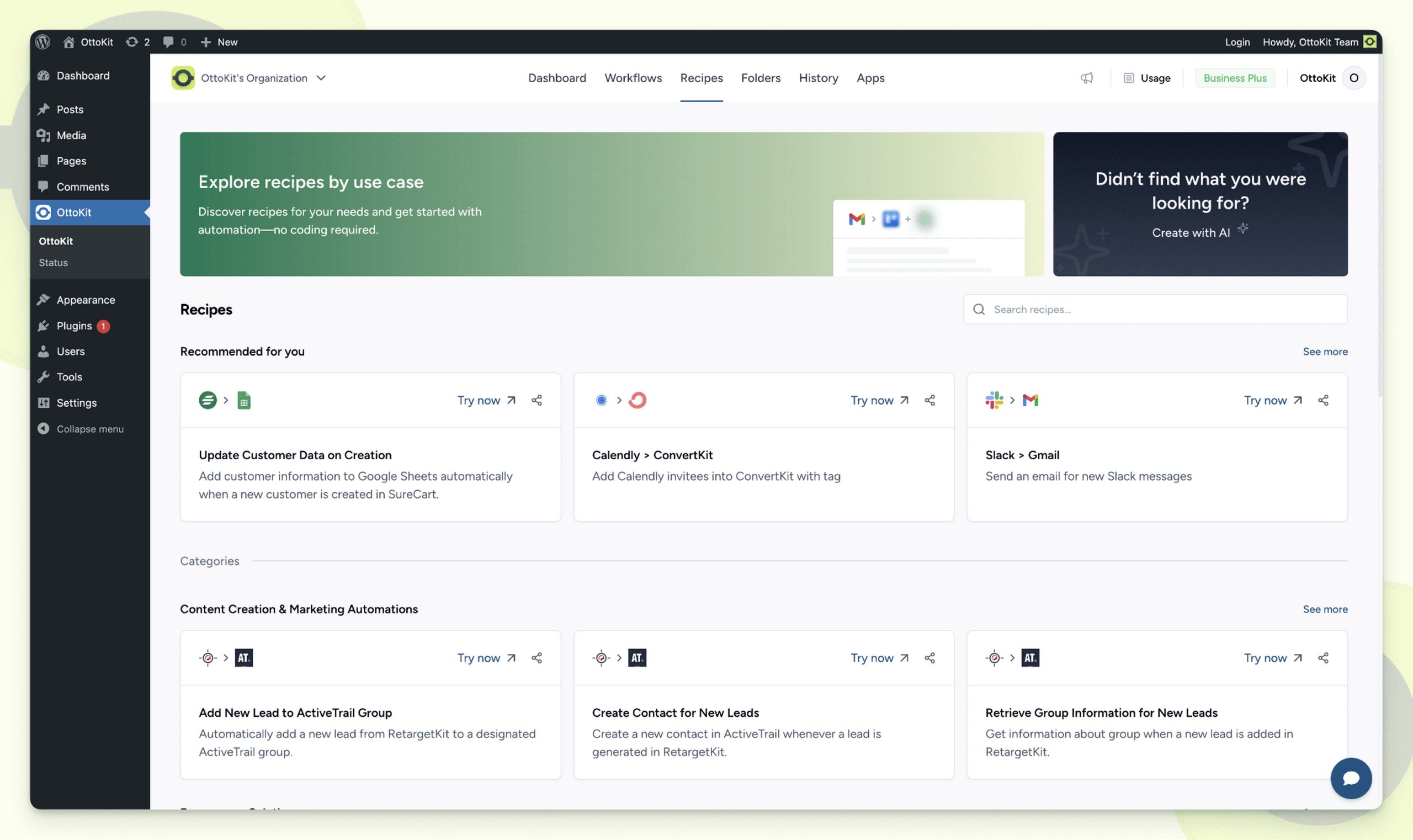
OttoKit provides advanced workflows with triggers, delays, and conditions. If you want your store to run more on autopilot while you focus on growth, this extension can help.
It offers deep WooCommerce actions like automatic coupon generation, points management, and customer tagging, making it perfect for complex automation needs.
Why we like it:
- Advanced workflows with complex triggers and conditions
- Deep WooCommerce integration with native actions
- SMS addons and extensive third-party integrations
- Powerful segmentation and customer lifecycle management
When to choose it:
- You need advanced automation beyond basic email sequences
- You want to create complex customer journey workflows
- You need SMS capabilities alongside email
- You’re ready to invest in sophisticated marketing automation
Limitations:
- Higher cost compared to basic email marketing extensions
- It can be overwhelming for stores with simple marketing needs
7. CartFlows Cart Abandonment
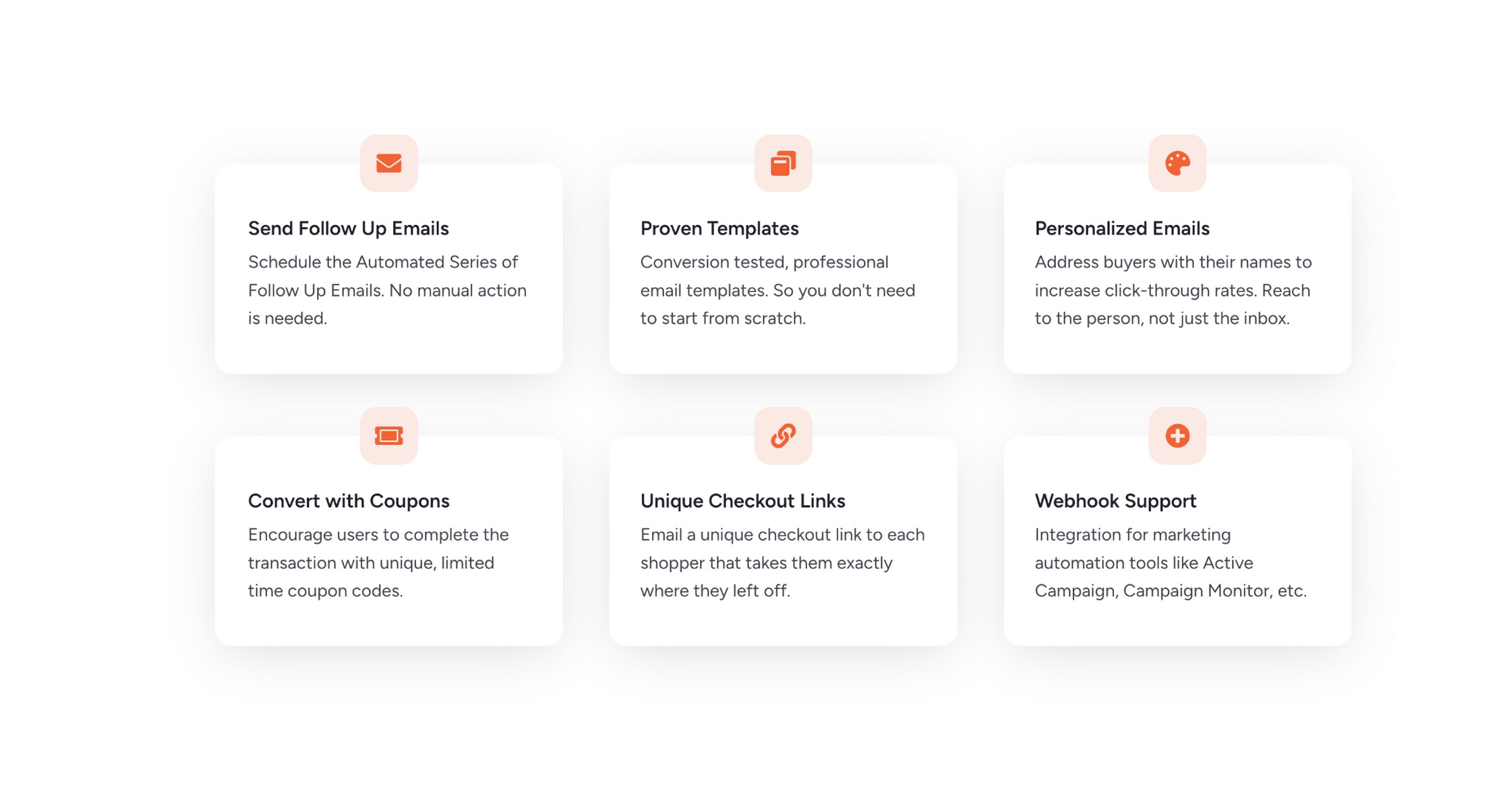
CartFlows Cart Abandonment captures shopper details early and follows up when a cart goes quiet. It’s one of the easiest ways to recover abandoned carts and delivers all the essential functionality we look for.
Why we like it:
- Captures email addresses early in the shopping process
- Customizable email templates with product images
- Integration with CartFlows checkout optimization
- Simple setup with proven email templates
When to choose it:
- You’re already using CartFlows for checkout optimization
- You want a straightforward cart abandonment solution
- You need basic recovery emails without complex automation
- You prefer integrated solutions over standalone tools
Limitations:
- Works best as part of the broader CartFlows ecosystem
SEO and Performance
49% of marketers say SEO provides the highest return on investment of all marketing channels. That’s why we decided to dedicate a section to plugins that help you improve SEO.
8. SureRank
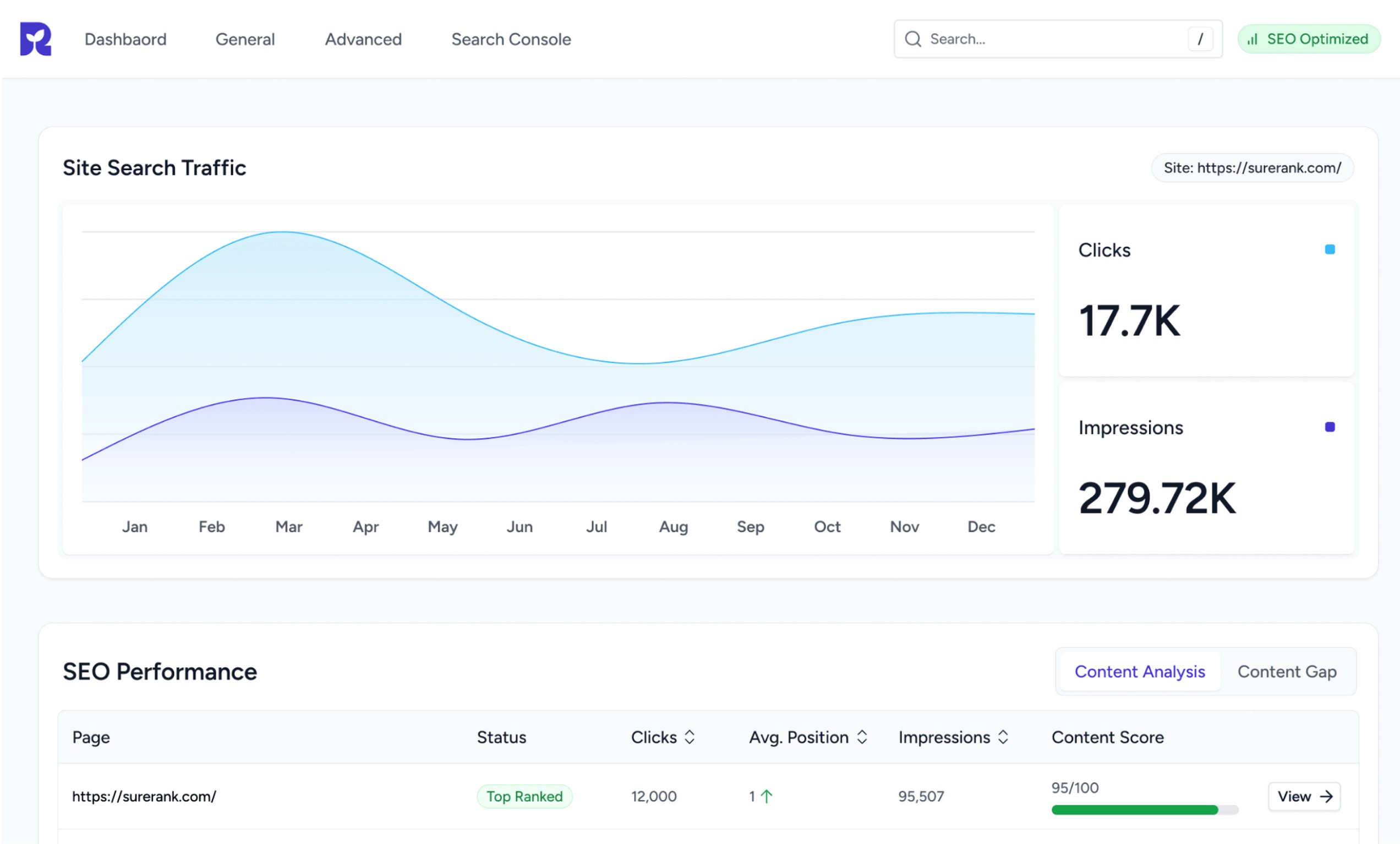
SureRank focuses only on the essentials and avoids bloat while delivering solid SEO performance for websites and stores.
It helps you set titles for your blog posts, create meta descriptions, and social previews with a simple interface, and covers product schema and basic e-commerce SEO needs.
Why we like it:
- Clean, guided setup for core SEO elements
- Product, category, and brand metadata optimization
- Lightweight footprint to protect site speed
- e-commerce-focused features
When to choose it:
- You want a focused SEO extension that’s easy to use
- You prefer a simpler, faster path to strong SEO basics
- Site speed is a priority, and you want minimal bloat
- You’re new to SEO and want a guided setup
Limitations:
- Fewer advanced features than comprehensive SEO plugins
- It’s new, so there’s a smaller community and fewer tutorials right now
9. Rank Math SEO
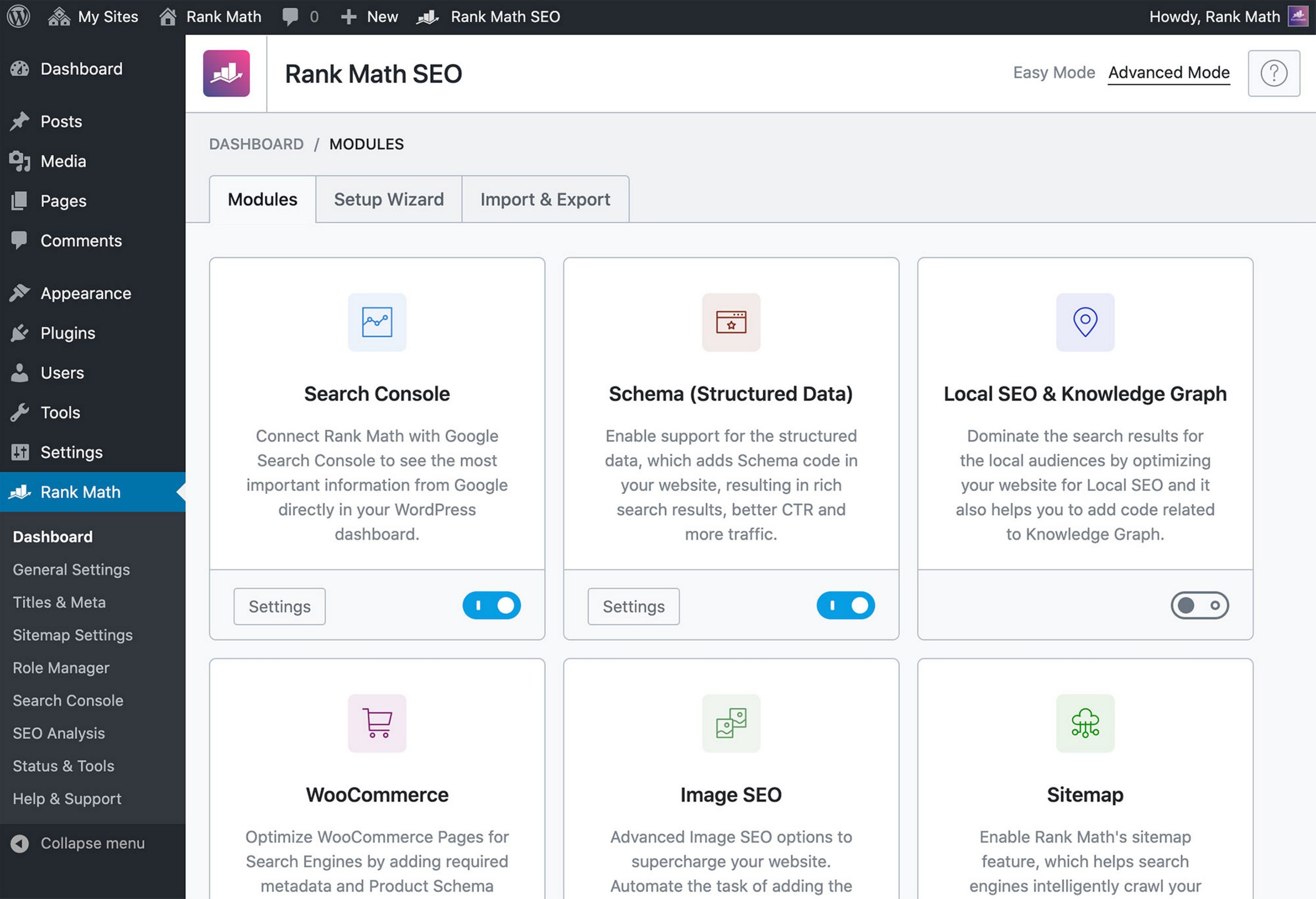
Rank Math is one of our favorite SEO plugins because it offers strong WooCommerce support.
It offers a whole lot of SEO related features, including schema markup, structured data, image SEO, site maps, search console integration, local SEO, knowledge graphs, and so much more.
Why we like it:
- Feature-rich, even in the free version
- Flexible schema, redirections, and analytics integrations
- Good for users who like more control
- Built-in keyword tracking and analytics
When to choose it:
- You want a comprehensive SEO solution with proven results
- You need advanced schema markup for products and reviews
- You want detailed content optimization guidance
- You’re serious about long-term SEO growth
Limitations:
- So many options can be overwhelming for beginners
- Premium features require additional investment
- Can slow down the admin area
- Requires a learning curve to use effectively
10. Smush
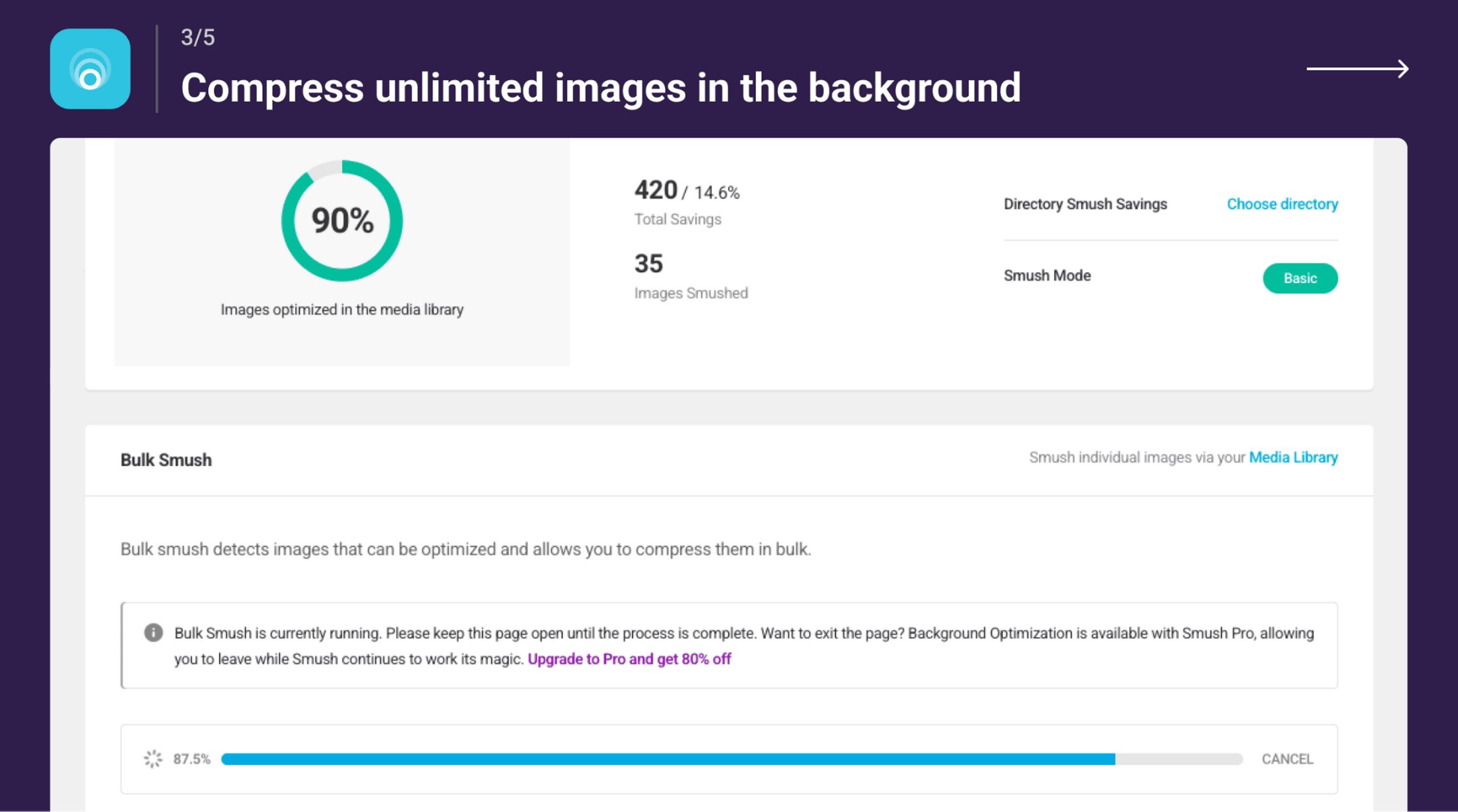
Smush compresses all your images the moment you upload them and converts them into modern formats like WebP.
As images can impact page speed and stores use more images than other sites, this extension is essential.
Why we like it:
- Automatic compression on upload
- WebP conversion with fallbacks for older browsers
- Bulk optimization for existing images
- Keeps original images backed up for reprocessing
When to choose it:
- Your site has many product images, which slows load times
- You want automatic optimization without manual work
- Mobile performance is crucial for your store
- You need better Core Web Vitals scores for SEO
Limitations:
- The free version has monthly compression limits
- WebP conversion requires the premium version
- May need additional CDN for maximum performance benefits
- Backup storage can use a significant server space
Product Management
Presentation matters. You want people to see clear information, strong visuals and smart offers to help them decide faster and buy with confidence.
11. WooCommerce Product Add-Ons
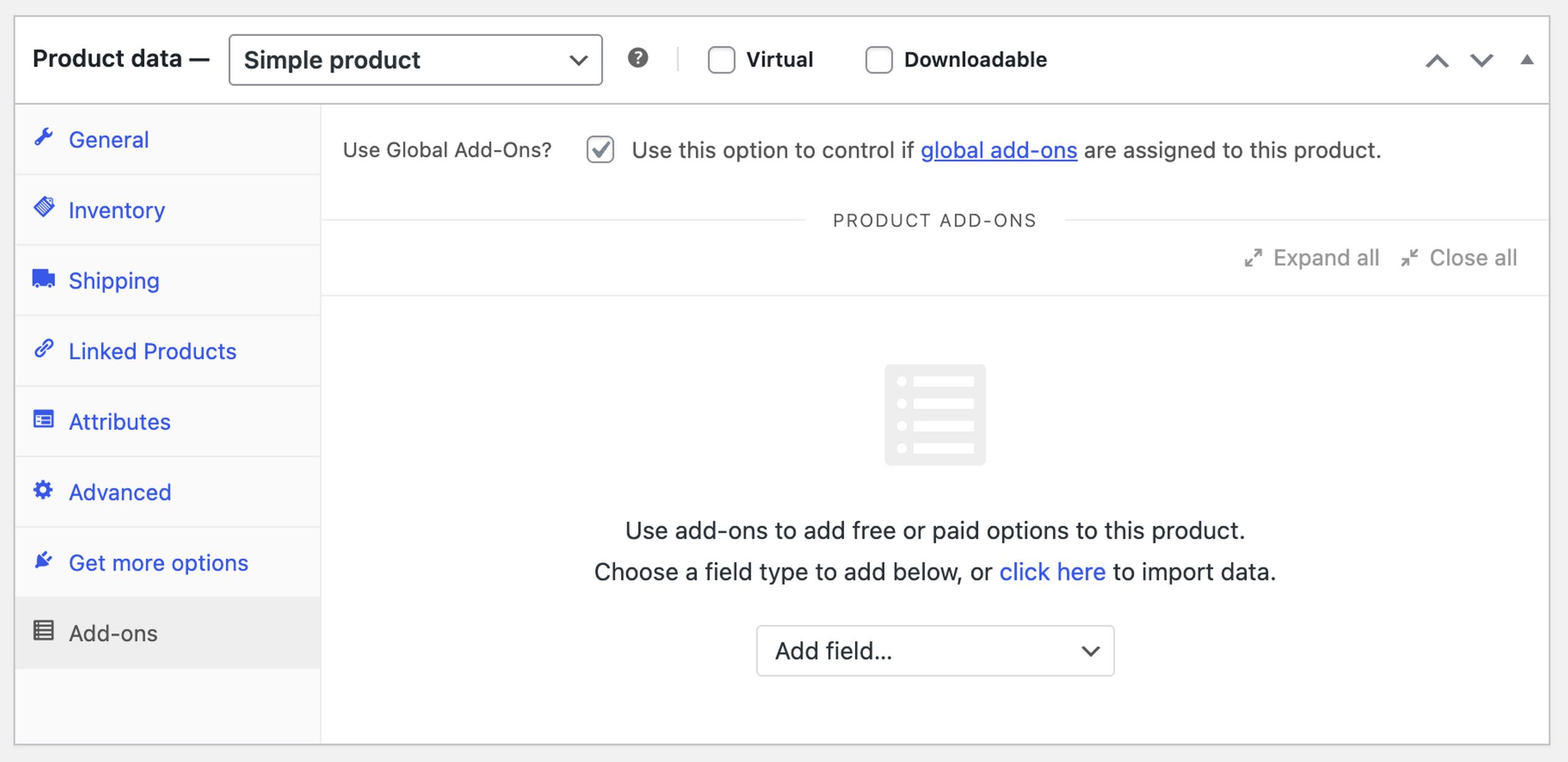
If you sell clothing, shoes or accessories, you know they often come in different colors, sizes and configurations.
WooCommerce Product Add-Ons helps manage all that by offering variable product options so it’s easy for customers to find their perfect fit.
Why we like it:
- Flexible customization options for any product type
- Dynamic pricing based on selected addons
- Support for text fields, file uploads, checkboxes, and dropdowns
- Integration with order management and invoicing
When to choose it:
- You sell customizable products like apparel, gifts, or services
- You need to charge extra for premium options or add-ons
- You want customers to upload files or add personal text
- You offer products with multiple configuration options
Limitations:
- Can complicate checkout if too many options are offered
- May require careful UX design to avoid overwhelming customers
- Premium pricing for advanced conditional logic features
12. YITH WooCommerce Zoom Magnifier
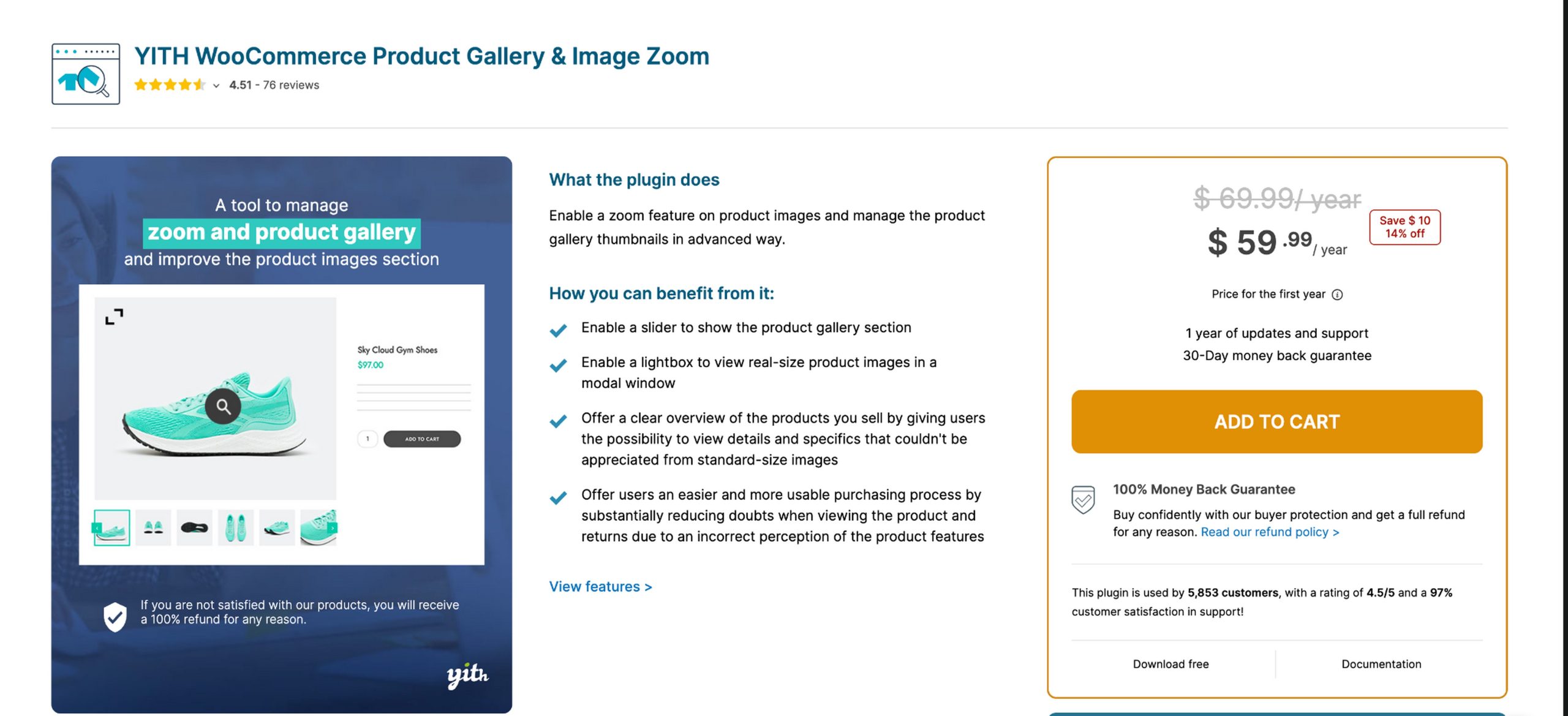
We buy with our eyes, especially online, so good quality images and the ability to get up close are essential.
YITH Zoom Magnifier is a WooCommerce extension you can install to let people zoom into your products, just like Amazon does, giving them better visibility and experience that they deserve.
Why we like it:
- Multiple zoom modes, including lens and inner zoom
- Mobile-friendly touch controls
- Customizable zoom intensity and lens size
- Lightweight and fast-loading
When to choose it:
- You sell products where details and texture matter
- Your product photos are high-quality and benefit from zoom
- You want to reduce returns due to unclear product images
- Customer feedback suggests they need better image viewing
Limitations:
- Only beneficial if you have high-resolution product images
- May not work well with all themes without customization
- It can be distracting if Zoom settings are too aggressive
- Additional load on mobile devices if not optimized properly
13. WooCommerce Variation Swatches
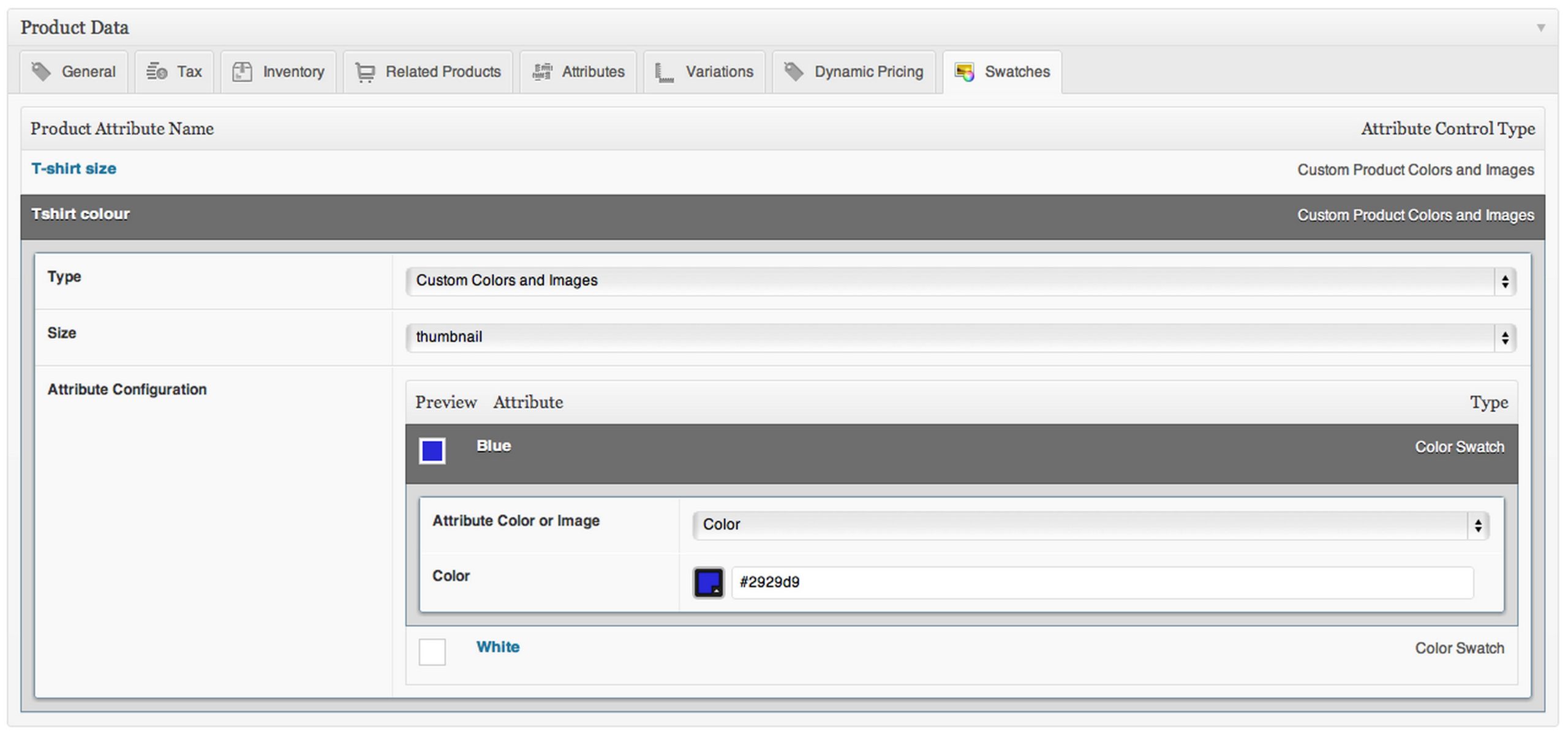
WooCommerce Variation Swatches allows you to show colors and designs as part of the drop-down menu. It’s a simple but very effective way of showing product options.
Rather than showing a simple text box or label, you can use color to give variations more of a visual impact to help decision-making.
Why we like it:
- Color swatches instead of confusing dropdown menus
- Image swatches that change the main product photo
- Custom labels and tooltips for better user experience
- Mobile-optimized touch-friendly controls
When to choose it:
- You sell products with color, size, or style variations
- Your current dropdown menus confuse customers
- You want a more professional appearance
- You have multiple product variations that benefit from visual selection
Limitations:
- Requires setup time to configure swatches for each product
- It can look cluttered if you have too many variations
- Premium features require additional investment
Customer Experience
Helpful support builds loyalty. Fast answers reduce refunds. Meet customers where they are with timely, contextual help.
14. LiveChat for WooCommerce

Every e-commerce store needs customer support. That is a non-negotiable. The only question is how you deliver it.
With LiveChat WooCommerce, you can offer real-time support on product and checkout pages with access to order history and customer context for faster resolution.
Why we like it:
- Real-time chat support during critical shopping moments
- Integration with WooCommerce customer and order data
- Mobile-friendly chat widget for all devices
- Automated greetings and proactive chat invitations
When to choose it:
- You can staff chat during peak shopping hours
- Customer questions often prevent sales completion
- You want to provide a premium, personalized support experience
- Your products benefit from real-time assistance and guidance
Limitations:
- Requires dedicated time to monitor and respond
- It can be expensive for small teams or businesses
- May overwhelm the support team if not properly managed
- Effectiveness depends on response time and staff training
15. WhatsApp Chat for WordPress
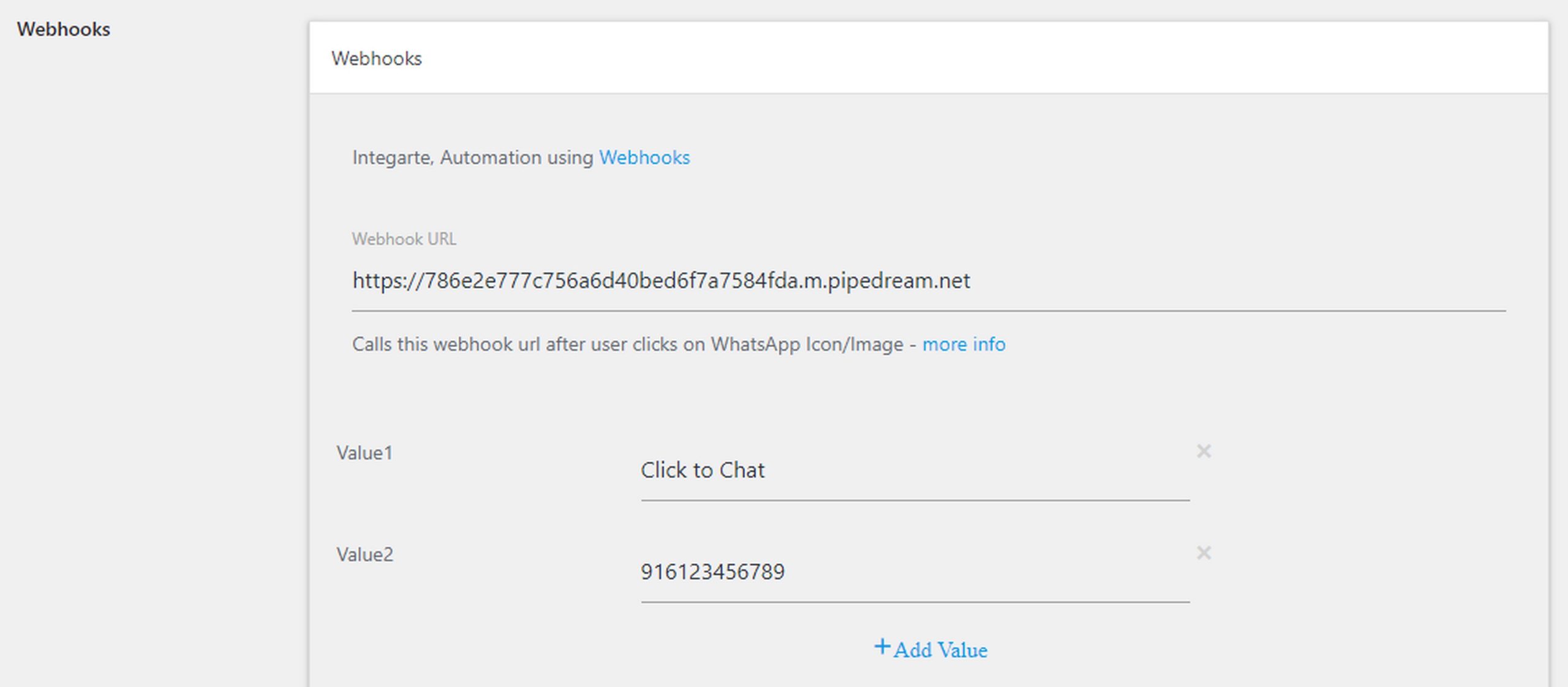
If all you want is for people to connect with you on WhatsApp, this WooCommerce extension is all you need.
WhatsApp Chat for WordPress is a simple plugin that gives you an option to create a simple chat button on the website that takes people to their WhatsApp.
Why we like it:
- Uses a messaging platform customers already know and use
- Perfect for mobile commerce and international customers
- Simple setup with customizable chat buttons
- Can include pre-filled messages for common inquiries
When to choose it:
- Your customers primarily use mobile devices for shopping
- You serve markets where WhatsApp is the preferred communication method
- You want to offer support through familiar channels
- You need a simple, cost-effective customer communication solution
Limitations:
- Requires managing conversations across multiple platforms
- Dependent on your WhatsApp availability and response time
- Limited to WhatsApp users only
16. WooCommerce Help Scout
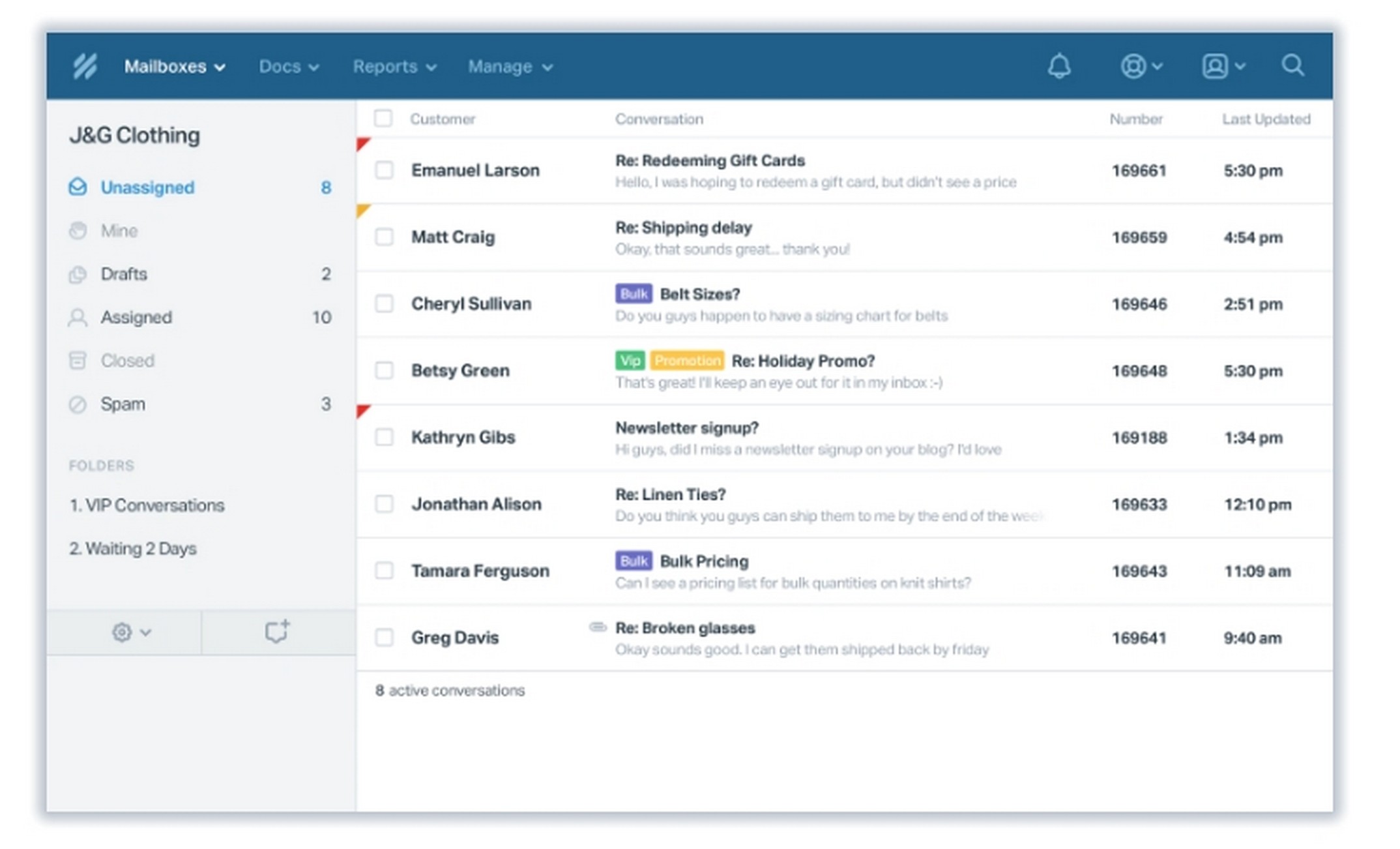
Help Scout is a popular customer support company, and their WooCommerce extension is a useful tool if you are already in that ecosystem.
It helps turn customer emails into organized tickets with full context from orders, customer history and previous interaction so that you can answer customers from a single chat.
Why we like it:
- Organized ticket system with WooCommerce order integration
- Complete customer context, including purchase history
- Team collaboration tools and internal notes
- Automated workflows and response templates
When to choose it:
- You receive high volumes of support requests
- You need to track support conversations and resolution times
- Multiple team members handle customer support
- You want detailed analytics on support performance and customer satisfaction
Limitations:
- Monthly subscription costs for team members may be overkill for stores with minimal support requests
- Requires training the team on the new support workflow
- Set up time needed for proper integration and automation
Analytics and Reporting
What you measure improves. Analytics show where to focus, which campaigns to scale, and what to fix.
17. Google Analytics for WooCommerce
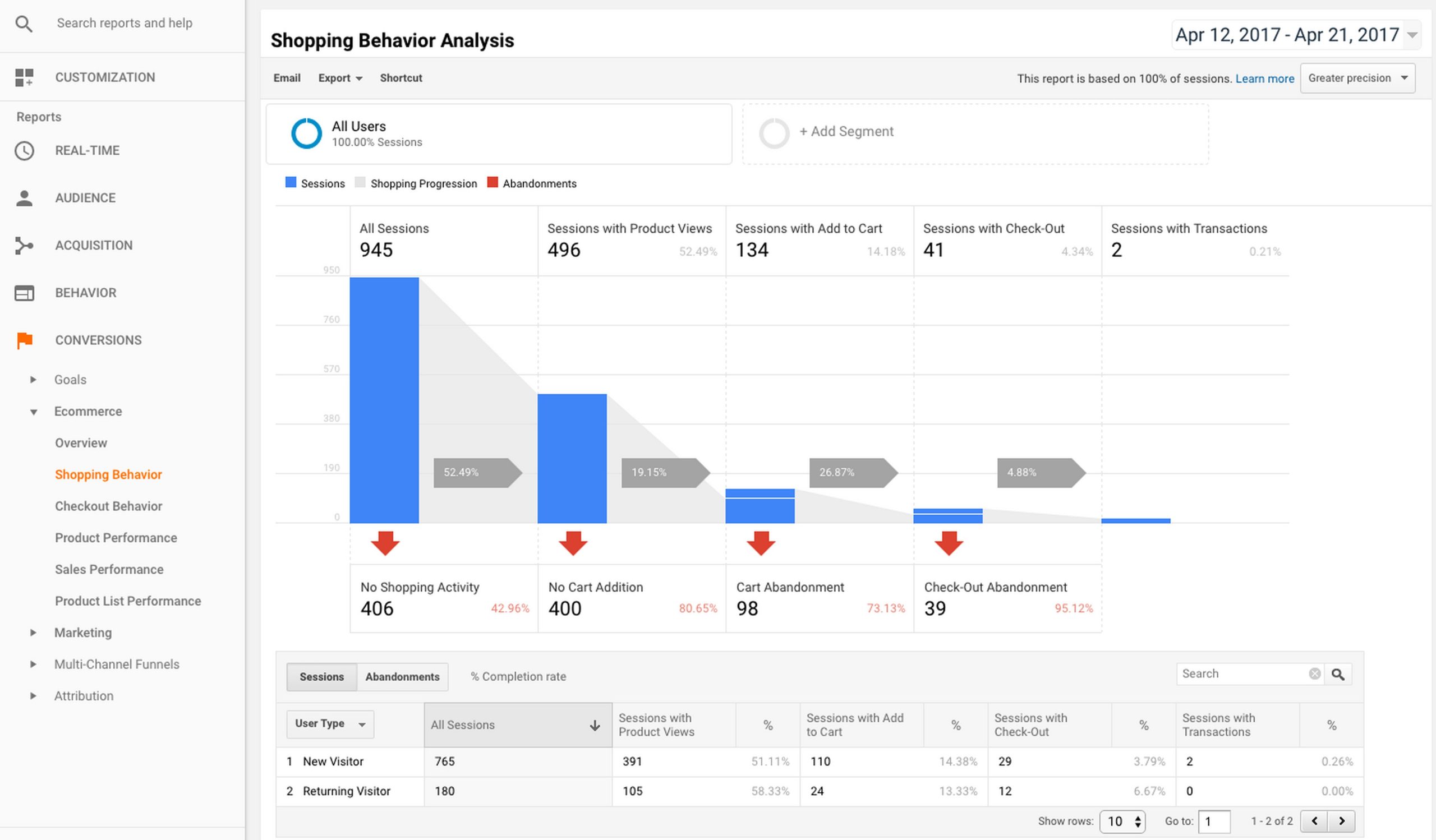
To grow a store and improve, you need to know what works and what doesn’t. Analytics is how you know.
Google Analytics for WooCommerce collates data so you can quickly see what sells, what works and what needs improvement. It’s about as easy as analytics gets.
Why we like it:
- Complete e-commerce tracking, including product performance
- Integration with Google Analytics 4 and Universal Analytics
- Tracks checkout behavior and abandonment points
- Measures advertising effectiveness and attribution
When to choose it:
- You want detailed insights into customer behavior and sales performance
- You run advertising campaigns and need attribution tracking
- You need to understand where customers drop off in your funnel
- You want to make data-driven decisions about your store
Limitations:
- Requires Google Analytics knowledge to interpret data effectively
- Setup can be complex for advanced e-commerce tracking
- Data sampling may occur for high-traffic sites
- Privacy regulations may limit tracking capabilities
Wrapping Up
WooCommerce extensions can transform your store, but don’t get lost in endless lists. Start with one problem, pick one plugin, and fix it.
Need a new payment gateway? Add the plugin, test it, move on. That’s how you grow your store, one simple step at a time.
Whatever extensions you choose, make sure to try CartFlows and Modern Cart.
Experience what it feels like to have a store matching the user experience of hugely successful enterprises like Amazon, Shopify and others!
FAQs
What’s the difference between a plugin and a WooCommerce extension?
Both plugins and WooCommerce extensions are add-ons for WordPress. A plugin can be general, like a contact form or a gallery. A WooCommerce extension is a plugin built for stores. It only makes sense when WooCommerce is active. These extensions talk to products, carts, orders, taxes, and checkout. That is why they feel native to e-commerce.
How many WooCommerce extensions are too many?
Focus on purpose and performance rather than numbers. If an extension doesn’t help with a clear goal, skip it. If two extensions overlap, keep the one that’s faster, simpler, and better supported. Watch your page speed and error logs. As a rule, a smaller set of well‑maintained extensions beats a large stack of niche extensions.
Are paid WooCommerce extensions worth it?
Often, yes. Paid extensions tend to ship better support, faster updates, and features that save time or unlock revenue. Free options are great for starting or simple needs. As orders grow, premium extensions usually pay for themselves through stability and automation. Look at the yearly cost against the revenue or time saved.


